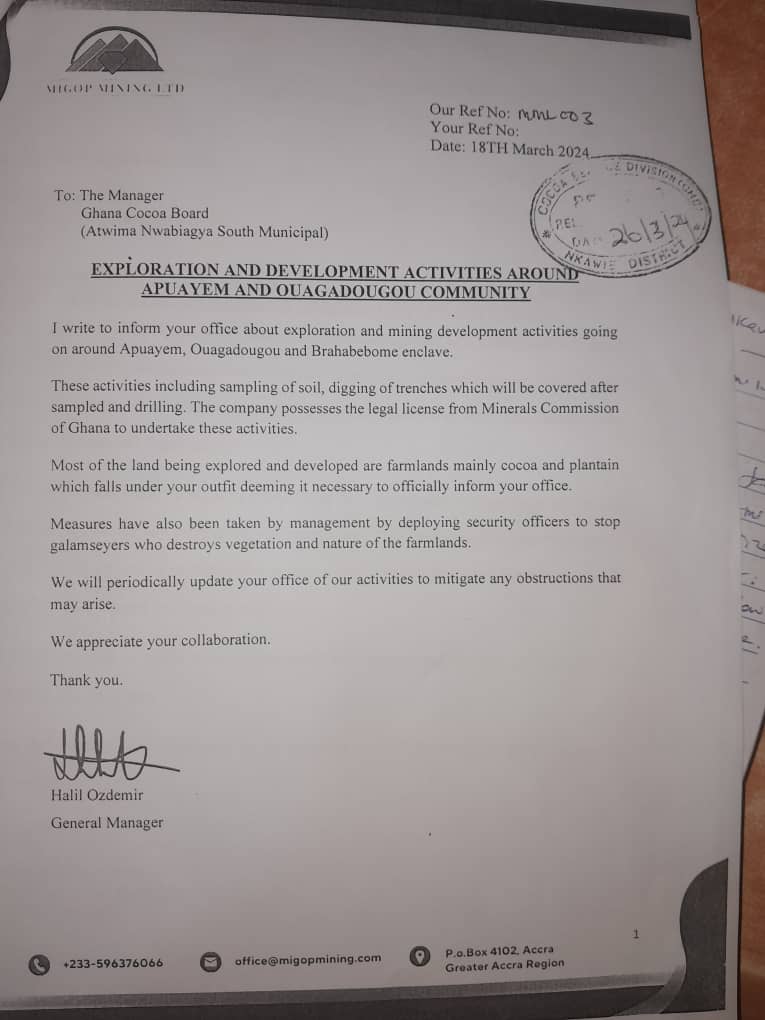
NKAWIE DISTRICT, 10/04/2024: Ghana’s cocoa production faces a looming threat as the Minerals Commission of Ghana reportedly grants permission to a foreign-owned gold mining firm, MIGOP Mining Limited (formerly known as BSD Mining), to utilize 4,343.69 hectares (10,859.225 acres) of cocoa plantation farmlands in the Nwabiagya South Municipality.
The said company is currently conducting exploration within the cocoa-producing communities of:
1. Apuoyem
2. Brahebebome
3. Brosanko
4. Ouagadougou
5. Nkotonmire
Unfortunately, this development impacts 169.76 hectares, comprising 190 individual farms currently undergoing rehabilitation under the COCOBOD Rehabilitation Programme.
Professor Michael Kwarteng, Head of the Anti-Illegal Mining Unit at COCOBOD, expressed concerns over potential losses to Ghana’s cocoa production.
He stated that Ghana stands to lose an average annual production of 9,556.12 metric tonnes, equating to GHS33,120.00 of Cocoa Producer Price and GHS316,498,628.16 in the Monetary Value of cocoa produced by the affected communities.
Reports from affected farmers indicate that the company has already erected barriers, hindering access to their farms.
Additionally, excavators and other earthmoving equipment have been deployed to remove newly rehabilitated cocoa trees and other vegetation for mining purposes.
The affected communities recently benefited from the Government and Ghana Cocoa Board’s cocoa rehabilitation programme between 2021 and 2023, with some newly established farms already yielding fruits.
Prior to this intervention, cocoa production in the area had sharply declined due to the Cocoa Swollen Shoot Virus Disease (CSSVD) outbreak.
The total area of cocoa farms affected by MIGOP Mining Ltd. in the three communities is 150.32 hectares.
The breakdown of cocoa farms rehabilitated in the communities over the last three years is as follows:-
2021: 73 hectares-
2022: 13.98 hectares-
2023: 63.32 hectares
Background to the National Cocoa
Rehabilitation Programme:As of 2017, the country had 1.9 million hectares of cultivated cocoa farms. However, a Cocobod survey in 2023 revealed that 592,230.02 hectares of cocoa farms are affected by CSSVD, with an additional 400,000 hectares categorized as moribund (over-aged and unproductive).
The rehabilitation effort has targeted 156,400 hectares of CSSVD-infected farms, funded by a $230 million loan from the African Development Bank.
The government compensated both landowners and cocoa farmers at a rate of GHS1,000.00 per hectare for the takeover of diseased farms. Over 62,000 hectares have been successfully rehabilitated, with 40,000 hectares pending handover this year.Implications:
In April 2022, Ghana Cocoa Board revealed that over 19,000 hectares of cocoa farms had been destroyed due to illegal gold mining activities. This figure is expected to have increased significantly since then.
The combined impact of CSSVD, cross-border smuggling, and illegal gold mining has resulted in a drastic decline in Ghana’s cocoa production.Moreover, pollution of water bodies and soil could lead to high levels of chemical residue in produce, risking rejection in the international market.
This would result in significant revenue losses for the government and exacerbate the economic crisis. The direct health impacts on residents of nearby communities cannot be overstated.
Production Data in Recent Years:
2020/21: 1,047,000 metric tonnes- 2021/22: 689,000 metric tonnes-
2022/23: 643,500 metric tonnes-
2023/24: 480,000 metric tonnes
(representing a 40% decline from the projected 800,000 metric tonnes)
In 2022, Ghana defaulted on its cocoa supply contracts with foreign buyers for the first time in history due to insufficient production.
Given the current rate of decline in cocoa production, exacerbated by disease, climate change, and illegal mining activities, the cocoa rehabilitation intervention remains the only hope for reviving Ghana’s cocoa industry.
Using Ghana’s average yield per hectare of 800kg, it can be estimated that the produce from the threatened 150.3 hectares of cocoa farms could fetch the country a significant sum yearly, based on the current world market price of cocoa at $10,000 per tonne.Perpetrators:
The mining company responsible for this operation is identified as MIGOP Mines Ltd. (formerly BSD Mining), with the following directors:
1. Yehuda Arie Leib Ingber (Co-Founder & Managing Director) – Israeli national
2. Baruch Miller [aka Bernie Miller] (Co-Founder & Director of Business Development)
3. Naa Kwama Mansa Williams (Company Secretary)
4. Halil Ozdemir – General Manager

On March 18, 2024, the company claimed legal authorization for exploration and gold mining development from the Lands Commission.
It has since entered the communities. Farmers allege that the company offered GHS10,000.00 per acre to acquire the farms for mining activities, an offer which they have rejected.




Ghana cocoa board is a government institution who should be able to stop this disastrous mining from taking place. Lobby the government. Mobilise the community leaders and mount a task force to stop this mining. You all sit down there and do nothing because the “government” has authorised something bad to go on. You’re all part of the government. Do your positive bit to save Ghana.